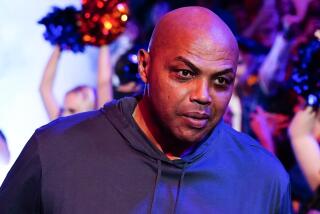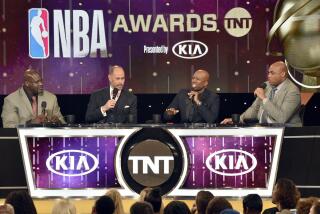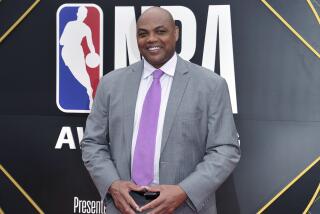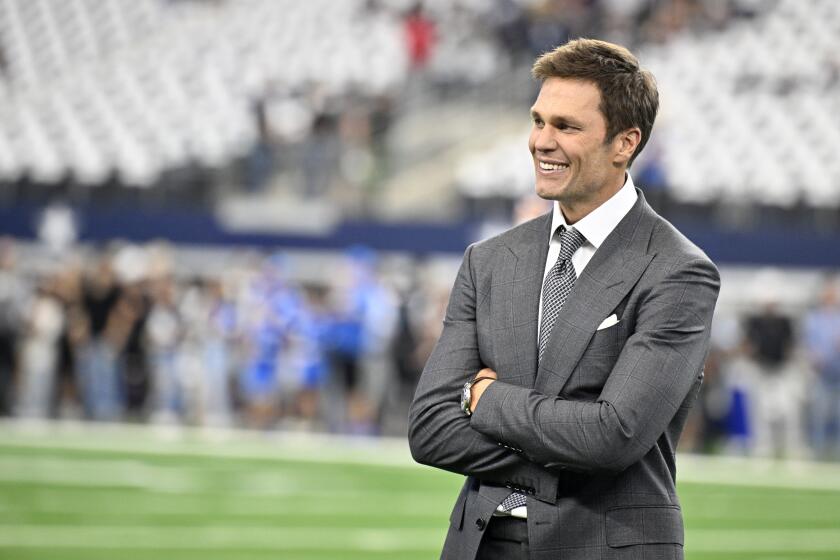Shooting From the Lip Is His Right
Charles Barkley is accusing professional basketball of racial injustice.
Charles Barkley is using the right of freedom of speech granted him by the Constitution of the United States of America to make strong allegations against a business enterprise, the Philadelphia 76ers, that draws its very name from the founding of the United States of America.
Charles Barkley is claiming that in the City of Brotherly Love, his employers keep a careful count on exactly how many brothers they are required to love.
Who is Charles Barkley?
Basketball’s most voluble player, that’s who.
An unlikely keynote speaker for the next convention of the National Assn. for the Advancement of Caucasian Players, Barkley has gone public with his opinion that the recent decision by the red, white and blue-garbed 76ers to keep one Dave Hoppen on their 12-player payroll has been based solely on Mr. Hoppen’s indelible, incurable whiteness.
Charles says he is just being honest.
Hoppen says Charles is just being Charles.
And the 76ers say Charles is being unfair. They say they play all the colors of the Spectrum. They say they gladly would play a dozen African-Americans, a dozen Anglo-Americans or a dozen Asian-Americans if they could dribble and dunk. They say basketball is a game of quarters, not quotas.
Charles says this is humbug. Charles says he thinks Harold Katz, his employer, prefers to keep at least one player of the Caucasian persuasion. Charles says he doesn’t consider Katz a racist. Charles says he doesn’t think of the team as Master Harold and the Boys. Charles says he just thinks Katz prefers to keep at least one white cat out there with all those black cats.
A point for Charles?
Well, it’s food for thought, at least, from the man who once ate so much and talked so much that his college nickname was “the Round Mound of Sound.”
Basketball has, some of us would prefer to believe, come a long way from that tarnished golden era when certain coaches whispered an off-color joke pertaining to how many players of color they would play: “Three at home, four on the road and five when we’re behind.”
Critics and fanatics alike of the Boston Celtics have unflinchingly sworn that the day Boston Garden houses nothing but Afro-Americans will be the day the arena is turned into a condo. This is denied, naturally, by those who run the Celtics, who further contend that anybody who employs Bob Cousy, John Havlicek, Larry Bird or Kevin McHale could hardly be expected to dump them because there are 12 superior players in training camp.
This argument does not apply to the 76ers, however, and Charles Barkley raises a number of questions. Perhaps first, simply to be thorough, a few preliminary questions are in order:
Who is Charles Barkley?
He is an outstanding player. He is outspoken and outrageous. He is an all-star and an Olympian. He plays like a tall man and like a small man. He might be, aside from Michael Jordan, the most entertaining player in basketball, although anybody building a championship team probably wouldn’t trade one Magic Johnson for five Charles Barkleys.
Who does Charles Barkley think he is?
Charles thinks he can say or do as he pleases. He can be charming as a prince and candid as a camera. He is intelligent yet indiscreet. He can be adorable and charitable. He also talks tough, plays rough, picks fights and accidentally spat on a child while deliberately spitting at an adult. For all his foibles, large shoe and deodorant companies choose Charles to endorse their products, even though he has never been confirmed as a champion or sportsman.
Does Charles have a case?
Yes, but one virtually impossible to prove. Had Philadelphia perpetually kept a white player in its starting lineup, Barkley’s point would be better taken. Few customers buy season tickets merely to see a white boy ride the bench. A case, in fact, could even be made that, like any business, a basketball team should hire at least one minority, even if it is a token one, even if it is a white one.
Give Barkley credit, nonetheless, for two things: Speaking his mind and making others think. Racism in Philadelphia could be worse than elsewhere. Does anybody in Los Angeles know or care if the Clippers, for example, have a white player? Racism in professional sport, meanwhile, intentional or innocent, still exists, as witness the parade of baseball managerial changes that continues to bypass qualified black candidates without bothering to stop.
Charles Barkley has something to say to white America. He may not always be right, but he does have a right to be heard. The ‘76ers--the 1776ers--promised him at least that much.
More to Read
Go beyond the scoreboard
Get the latest on L.A.'s teams in the daily Sports Report newsletter.
You may occasionally receive promotional content from the Los Angeles Times.










